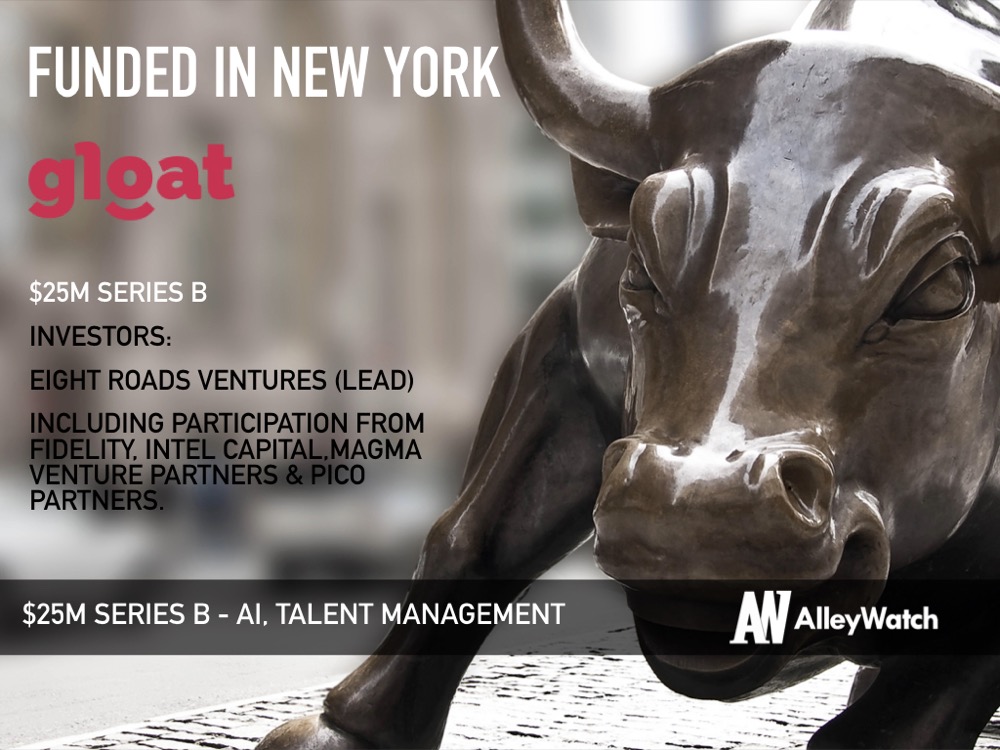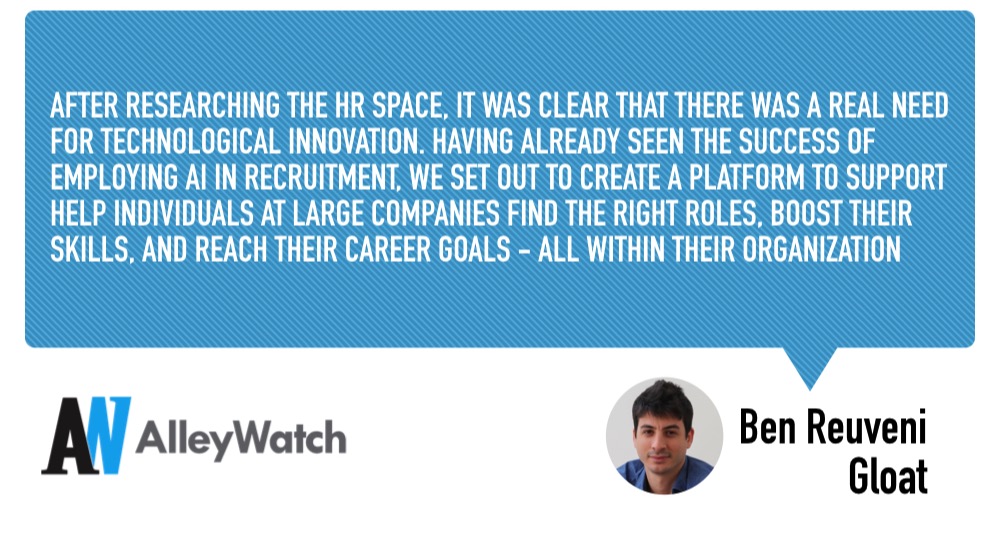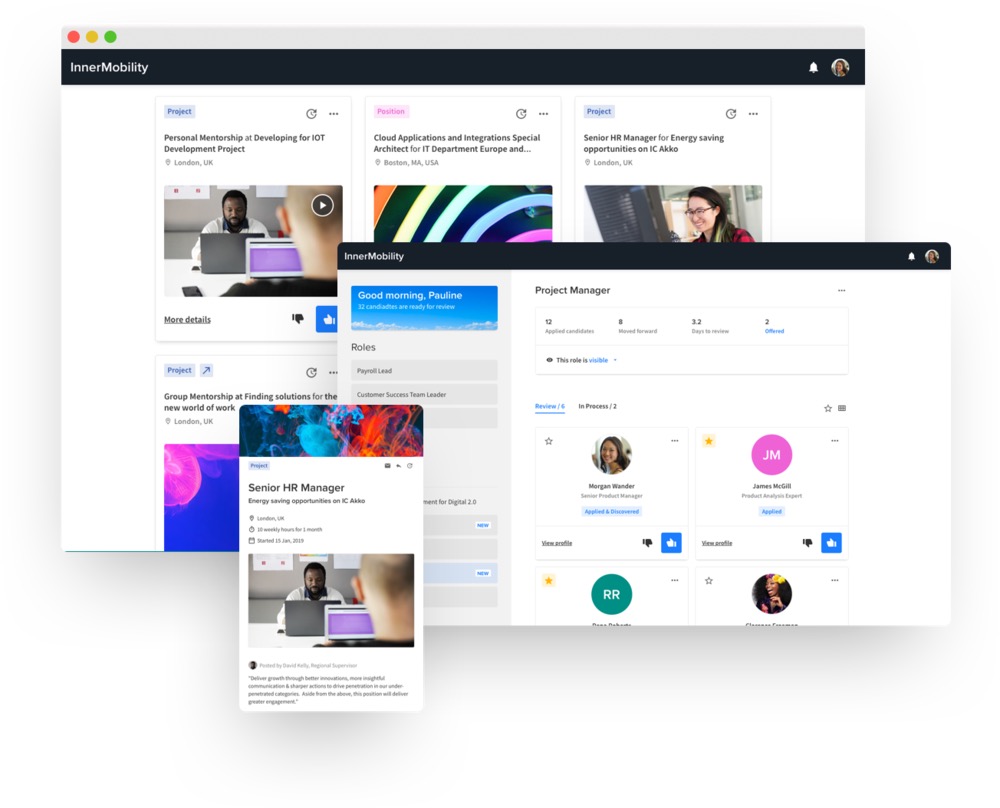There is a constant buzz about AI and the potential impacts it will have on the workforce. Gloat changes the conversation with its AI-powered talent marketplace that matches people with highly personalized opportunities that include internal part-time projects, gigs, mentorships, and even job swaps that will allow people to develop skills and expand their network. Businesses who use Gloat can benefit from its real-time insights that will allow managers, at large companies, to understand the talent and skill gaps in their internal workforce. Gloat is already being used at companies like Unilever and Schneider Electric.
AlleyWatch sat down with Ben Reuveni about Gloat’s mission and recent fundraising round, which brings total funding raised to $34.6M throughout three rounds.
Who were your investors and how much did you raise?
We raised $25M for our series B funding round. The round was led by Eight Roads Ventures, the proprietary investment firm backed by Fidelity, alongside Intel Capital. Existing investors Magma Venture Partners and PICO Partners also participated.
 Tell us about the product or service that Gloat offers.
Tell us about the product or service that Gloat offers.
Gloat boosts enterprise business growth by empowering employees to achieve their career potential. Our AI-powered internal talent marketplace provides full visibility on an individual’s unique career path, by analyzing different possible career options and following the achievements and aspirations of an employee from their first day at the company. It then proactively matches employees with internal part-time projects, gigs, full-time positions, mentorships, and job swaps so they can grow and gain targeted new skills, while also expanding their network.
Previously, career progress was limited to the well-networked and privileged, now career growth is being democratized as a user-friendly platform and mobile application. Gloat also enables enterprises to gain real-time insights into their internal talent pools and impending skills gaps, providing managers with the frictionless access to the skills they need without the need for costly external recruitment.
What inspired the start of Gloat?
I served in the Israeli army’s elite 8200 intelligence unit, where I utilized AI to streamline the recruitment process. That’s where I fell in love with the idea of technological matchmaking. Even outside of my professional life, I love setting up my friends, so it’s no surprise that we’ve built a match-making Artificial Intelligence for career satisfaction. After the army, I spent six years in various roles at IBM but maintained a strong connection to the HR perspective of life, constantly thinking about how people can fulfill their potential, how companies can ensure their employees are thriving, and what could improve today’s workplace.
After researching the HR space, it was clear that there was a real need for technological innovation. Having already seen the success of employing AI in recruitment, we set out to create a platform to support help individuals at large companies find the right roles, boost their skills, and reach their career goals – all within their organization. What started as an exploration into how to find career satisfaction without leaving the company turned into an unprecedented solution for employee retention, engagement, and happiness for large enterprises.
How is Gloat different?
Our artificial intelligence-based internal talent marketplace sparked a new category in the HR space. Our solution is the first in its class and years ahead of the competition in terms of artificial intelligence development and real-world implementation at some of the world’s biggest employers.
Who do you consider to be your main competitors?
Our InnerMobility solution is really a first-in-class as we defined the new category of internal talent marketplaces, so there aren’t true competitors quite yet to speak of, though we’re starting to see HCM vendors like Workday stepping into our space.
What market does Gloat target and how big is it?
We’re primarily targeting enterprise and midmarket companies.
What’s your business model?
Gloat is a SaaS company with a yearly subscription model based on the number of employees.
What are the biggest challenges that you faced while raising capital?
For us, the most important thing was finding the right VCs for this point in our company journey who share our values and goals. We certainly believe we found that with Eight Roads Ventures and Intel Capital.
What factors about your business led your investors to write the check?
Our technology solves a problem that costs large enterprises on average $400M annually in costs associated with retention while increasing employee satisfaction – a win-win by everyone’s standards. As the first in our field, we are proud to be leading the way in helping enterprises evaluate their workforce, as individuals with unique skill sets and ambitions pave the way to maximize output while also increasing employee engagement.
The momentum we’ve achieved in the last year and the increasing demand we’re getting from the market proves that our solution is at the forefront of the future of work and that certainly attracted investors.
What are the milestones you plan to achieve in the next six months?
In the next six months, we plan to almost double our headcount. We are hiring across all functions as we scale the company to meet the tremendous demand in the market for our InnerMobility solution for enterprises. We’ll also offer our InnerMobility platform in more exciting languages, in addition to its current English and French.
We’ll also offer the our InnerMobility platform in more exciting languages, in addition to its current English and French.
What advice can you offer companies in New York that do not have a fresh injection of capital in the bank?
My advice is to research and really understand your market and your place in that market. Assessing the demand for your product or service is crucial to properly articulating how you can change the game and why investors should want to join you.
Where do you see the company going now over the near term?
In the near term, we plan on focusing on scaling to meet the growing demand for our enterprise solution.
What’s your favorite restaurant in the city?
Katz’s.






